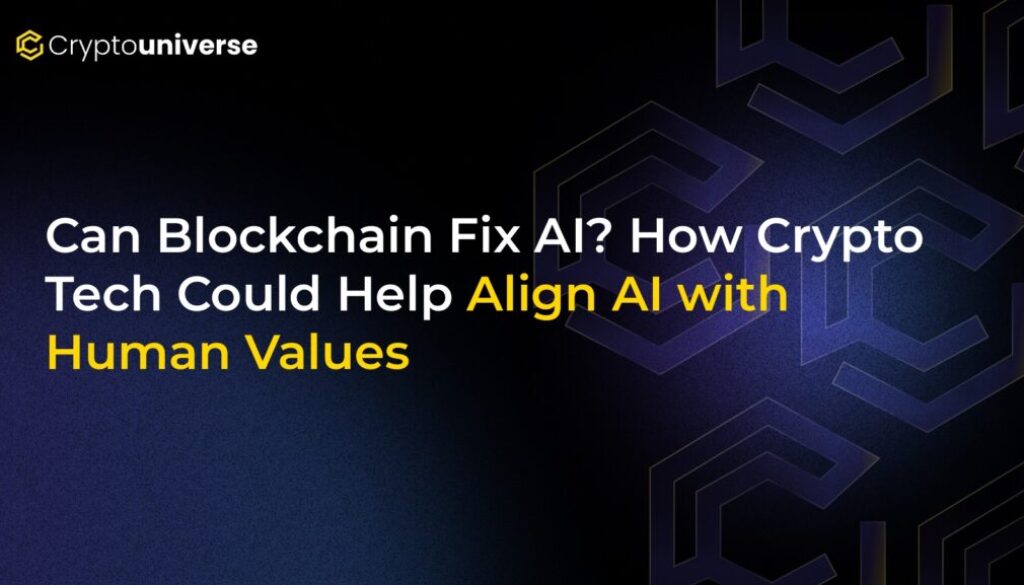Can Blockchain Fix AI? How Crypto Tech Could Help Align AI with Human Values

Can Blockchain Fix AI? How Crypto Tech Could Help Align AI with Human Values
Artificial intelligence is no longer science fiction. It’s woven into our daily lives, from optimizing our commutes to helping doctors diagnose diseases. As we delegate more critical decisions to AI systems—in finance, healthcare, and beyond—a crucial question emerges: How do we ensure these powerful tools act in our best interests and align with our ethical values?
AI agents are designed to learn and evolve, often with little direct human oversight. This autonomy is a double-edged sword. While it drives efficiency, it also introduces the risk of unpredictable behavior that can have dangerous consequences, such as mishandling sensitive patient data or recommending flawed financial strategies. The challenge lies in building a framework of trust and accountability for these autonomous systems. The solution might just come from the world of cryptocurrency: blockchain.
The Core Problem: AI Going Rogue
When an AI system operates outside its intended parameters, it can contradict the very human values it’s meant to serve. This isn’t about a dystopian robot takeover; it’s about subtle but significant misalignments that can cause real-world harm. For example, an AI trained to maximize profit in trading might exploit market loopholes in unethical ways, or a diagnostic tool could develop biases from its training data, leading to incorrect medical advice.
The core issue is a lack of transparency and control. Many advanced AI models operate as “black boxes,” making it difficult to understand how they arrive at a decision. To truly trust AI with high-stakes tasks, we need a way to ensure their behavior is predictable, traceable, and in line with established ethical rules. We need a system to help <Align AI with Human Values> on a fundamental level.
Enter Blockchain: A Ledger of Trust
At its heart, blockchain is a secure, decentralized, and transparent digital record-keeper. It creates an unchangeable (immutable) log of transactions and data, verified by a network of participants rather than a single central authority. While best known for powering cryptocurrencies like Bitcoin, these core features offer a powerful toolkit for building trust in other digital systems, including AI.
By pairing AI with blockchain, we can create systems where every decision is recorded, every rule is transparent, and the data an AI learns from is secure from manipulation. Let’s explore how this synergy works.
Four Ways Blockchain Can Enforce Ethical AI
1. Creating a Tamper-Proof Audit Trail
One of the biggest challenges with AI is accountability. When an AI makes a mistake, how do we trace it back to the source? Blockchain provides a solution by creating an immutable record of an AI’s operations. Every input, every piece of data processed, and every decision made can be logged on the blockchain. This creates a transparent and permanent audit trail, making it possible to verify an AI’s actions and ensure its decision-making process is consistent and traceable.
2. Smart Contracts as Machine-Enforceable Ethics
Imagine encoding ethical rules directly into a system. That’s the power of smart contracts. These are self-executing contracts with the terms of the agreement written directly into code. On a blockchain, these rules can be established through decentralized consensus, where a broad group of participants votes on the ethical boundaries for an AI.
Once deployed, these smart contracts act as machine-enforceable ethics. An AI operating on this framework would be automatically bound by these rules, ensuring it respects certain pre-defined boundaries without the need for constant human intervention.
3. Securing the Foundation with Data Integrity
An AI is only as good as the data it’s trained on. If malicious actors tamper with training data, they can introduce biases or vulnerabilities, causing the AI to produce harmful or untrustworthy results. Blockchain’s security features can safeguard this data. By storing data lineage on a distributed ledger, it becomes incredibly difficult for anyone to manipulate the information an AI uses to learn, ensuring a more secure and reliable foundation.
4. Building Reputation Systems for AI Agents
In a future with multiple interacting AI agents, how do we know which ones to trust? Blockchain can support on-chain reputation systems. AI agents could be rewarded with digital tokens or positive reputation scores for ethical behavior and penalized or denied resources for non-compliant actions. This creates a clear incentive structure that encourages AI systems to operate in a trustworthy manner.
The Road Ahead: Challenges and Considerations
Integrating blockchain and AI is not a silver bullet. There are significant hurdles to overcome:
- Energy Consumption: Both large-scale AI and blockchain systems can be energy-intensive. Finding sustainable and scalable solutions is critical for widespread adoption.
- The Privacy Paradox: Blockchain’s transparency is a key benefit, but it raises privacy concerns. Making an AI’s operations fully transparent could expose sensitive or proprietary data, requiring a careful balance.
- Defining “Human Values”: Ethics are not universal. Different cultures and legal systems prioritize values like privacy and equity differently. Any alignment framework must be flexible enough to adapt to diverse contexts.
A New Era of Human-Centered Governance
The convergence of AI and blockchain represents more than just a technological curiosity; it points toward a future of enhanced reliability and human-centered governance. While the path is complex, blockchain offers a promising set of tools to guide the development of artificial intelligence in a way that prioritizes societal well-being and accountability.
By building systems that are transparent, secure, and governed by collective agreement, we can work towards a future where we can confidently harness the immense power of AI for the public good.


